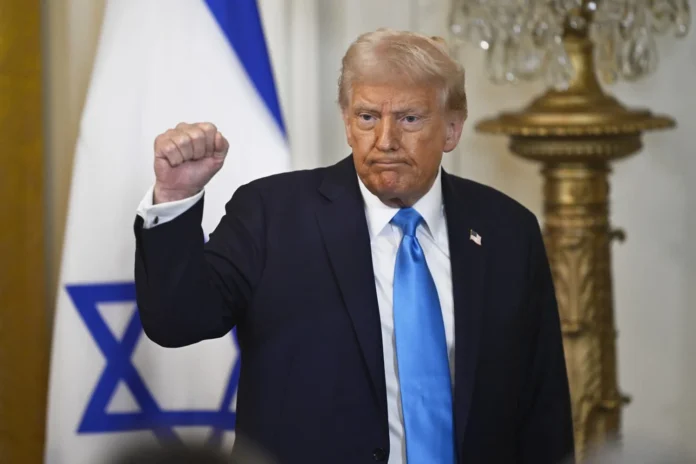Introduction
The Trump Gaza Plan—a unilateral proposal for the U.S. to “take over” Gaza and redevelop it into a luxury enclave—ignited immediate global condemnation, legal scrutiny, and fears of derailing Middle East peace efforts. This analysis reveals 7 critical reasons why allies, adversaries, and international bodies rejected the strategy, unpacking its implications for Palestinian sovereignty, ceasefire negotiations, and U.S. diplomatic credibility.
Violations of International Law and Palestinian Self-Determination
The Trump Gaza Plan faced universal condemnation for contravening international humanitarian law (IHL) and UN resolutions supporting Palestinian statehood. Legal experts, including the International Committee of the Red Cross (ICRC), emphasized that annexing occupied territory violates the Fourth Geneva Convention (Article 49), which prohibits forcible displacement.
- Key Legal Analysis:
- The Hague-based International Court of Justice (ICJ) previously ruled in 2004 that Israel’s separation barrier in the West Bank violated international law, setting a precedent against territorial seizures.
- Amnesty International warned the plan could constitute a war crime under the Rome Statute if implemented.
- Palestinian Response:
- PA President Mahmoud Abbas declared the plan “a death sentence for the two-state solution,” citing UN Resolution 242, which mandates Israeli withdrawal from occupied territories.
- Gaza resident Moeen Mohsen: “We survived bombs, but displacement is another death. We demand our right to return under UN Resolution 194.”
Undermining the Fragile Israel-Hamas Ceasefire
The proposal surfaced during Phase 1 of a six-week ceasefire deal brokered by Egypt and Qatar, which had already secured the release of 18 hostages. Hamas tied further releases to Israel’s compliance, but the Trump Gaza Plan introduced uncertainty, risking a collapse.

- Hostage Families’ Anguish:
- Ronen Neutra (father of Omer Neutra, killed on Oct. 7): “This plan prioritizes politics over lives. Every delay risks my son’s body remaining in Gaza.”
- Data Insight: 136 hostages remain in Gaza, per Israeli government figures.
- Hamas’ Ultimatum:
- Senior official Basem Naim: “Any deviation from the ceasefire’s three-phase structure will end negotiations.” Analysts warn a breakdown could reignite conflict, destabilizing Egypt’s Sinai Peninsula and southern Israel.
Regional Allies Reject Annexation, Demand Two-State Progress
Saudi Arabia, Jordan, and Egypt—key U.S. partners—issued rare unified statements opposing the plan, reaffirming their commitment to Palestinian statehood.
- Saudi Arabia’s Firm Stance:
- Foreign Ministry: “Normalization with Israel requires irreversible progress toward a Palestinian state with East Jerusalem as its capital.”
- Context: Crown Prince Mohammed bin Salman seeks to balance U.S. ties with Arab public opinion, where 85% oppose normalization without Palestinian rights (2023 Arab Barometer survey).
- Egypt’s Security Concerns:
- President Abdel Fattah el-Sisi warned that displacing Gazans into Sinai would “turn Egypt into a base for terrorism,” referencing ISIS-linked insurgencies.
- Jordan’s Diplomatic Push:
- King Abdullah II: “Annexation threats violate the 1994 Israel-Jordan peace treaty,” risking regional escalation.
Global Condemnation: From Europe to Asia
France, the UK, Germany, China, and Russia unanimously rejected the plan, framing it as a threat to multilateralism.
- European Union’s Response:
- EU Foreign Policy Chief Josep Borrell: “The EU will not recognize changes to 1967 borders. A viable Palestinian state is non-negotiable.”
- France: Pledged €50 million in aid to Gaza, emphasizing reconstruction over annexation.
- China’s Strategic Critique:
- Foreign Ministry: “Respect Palestinian sovereignty. External powers cannot impose solutions.” Analysts note China’s growing Middle East mediation role, leveraging its UN Security Council veto power.
Humanitarian Catastrophe in Gaza: A Tinderbox Ignored
The Trump Gaza Plan overlooked Gaza’s dire humanitarian crisis, where 2.3 million Palestinians face a 16-year blockade, 80% aid dependency (UNRWA), and 45% unemployment (World Bank).
- UN Warning:
- “Forced displacement would exacerbate Gaza’s crises,” stated UN Special Rapporteur Francesca Albanese, noting 1.9 million Gazans are already internally displaced.
- Health System Collapse:
- Only 12 of Gaza’s 36 hospitals are partially functional (WHO). Infectious diseases like hepatitis A have surged 200% since October 2023.
U.S. Credibility Erosion and Netanyahu’s Political Gamble
The plan exposed rifts between Trump’s “America First” approach and Biden’s support for a two-state solution, undermining U.S. neutrality.

- Netanyahu’s Calculated Risk:
- PM Netanyahu’s far-right coalition (e.g., Finance Minister Bezalel Smotrich) opposes Palestinian statehood, but experts warn alienating Saudi Arabia jeopardizes normalization talks.
- Chatham House Insight: Dr. Sanam Vakil: “Trump aims to bolster Netanyahu’s coalition while dangling Saudi normalization—a high-risk, low-reward strategy.”
- Biden Administration’s Rebuttal:
- National Security Advisor Jake Sullivan: “The U.S. remains committed to a two-state solution. Unilateral actions won’t achieve lasting peace.”
Historical Precedent: Comparing Past U.S. Middle East Policies
The Trump Gaza Plan echoes contentious strategies like the 2020 “Peace to Prosperity” plan, which allocated 70% of the West Bank to Israel. Both faced global rejection for bypassing Palestinian voices.
- Failed Mediation Lessons:
- 1993 Oslo Accords: Highlighted the need for mutual recognition, which the Trump plan ignored.
- 2002 Arab Peace Initiative: Offered Israel normalization with 57 Arab states in exchange for Palestinian statehood—a framework still endorsed by the Arab League.
Conclusion: A Blueprint for Conflict, Not Peace
The Trump Gaza Plan underscores the perils of unilateralism in a multipolar world. With 153 UN member states recognizing Palestine and global powers demanding adherence to international law, sustainable peace requires inclusive diplomacy—not imposed solutions.


